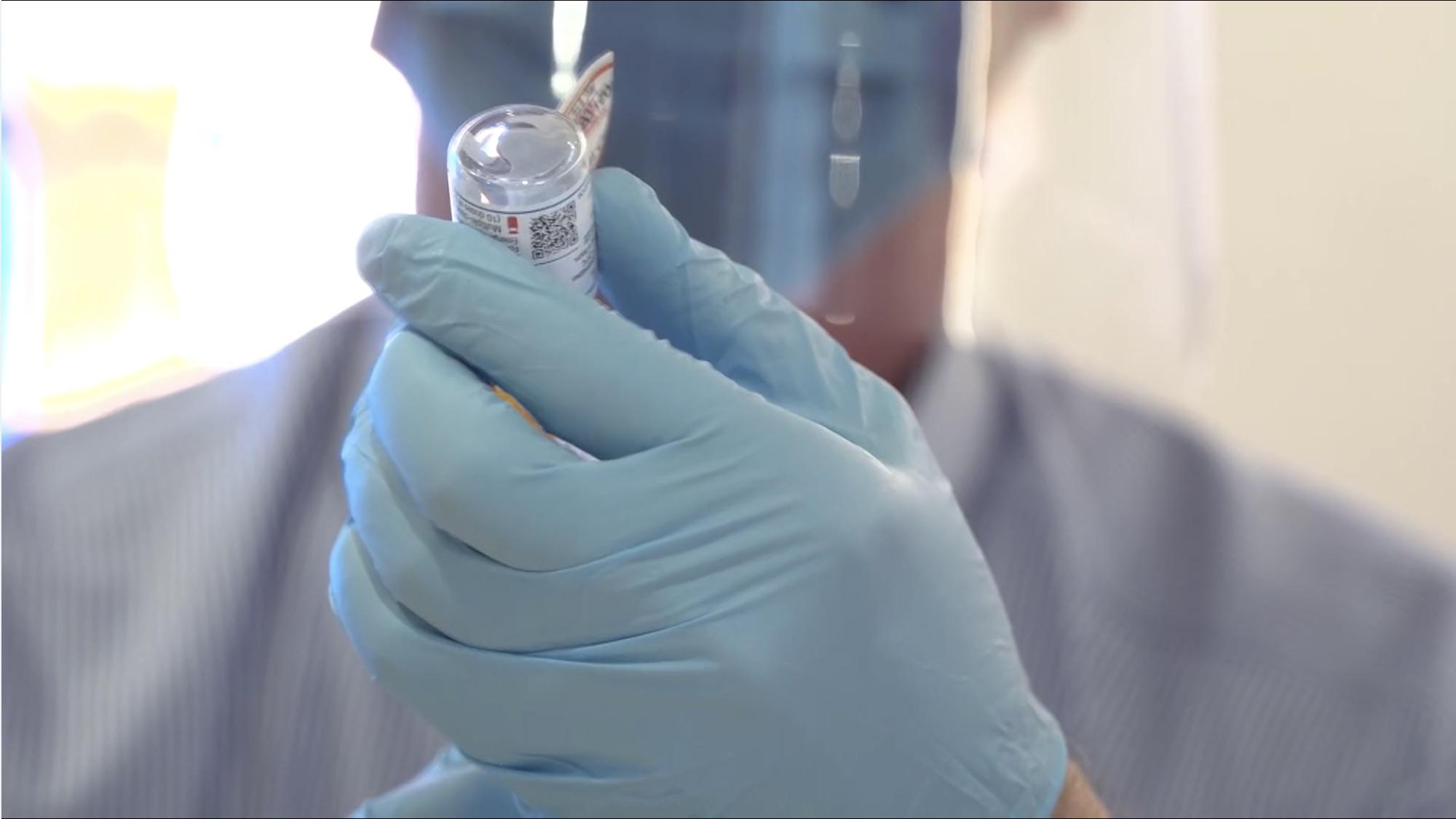When Pastor Mark Meeks of City Church of Sacramento told his city councilman, Jay Schenirer, that he wanted to make sure people in Oak Park would have access to the COVID-19 vaccine, Schenirer introduced Meeks to UC Davis Health CEO David Lubarsky. Thanks to that connection, in February, an old section of the church sanctuary was quickly converted into a full-fledged vaccine clinic.
Meeting people where they are to administer COVID-19 vaccines has been a hurdle to jump for UC Davis physicians, medical staff, faculty and students. Near the end of winter when a steadier supply of vaccines began to arrive across the Sacramento area, UC Davis leaders worried about whether medically underserved populations would have access to the shot. Statistics exposed alarming rates of infections in poorer neighborhoods.
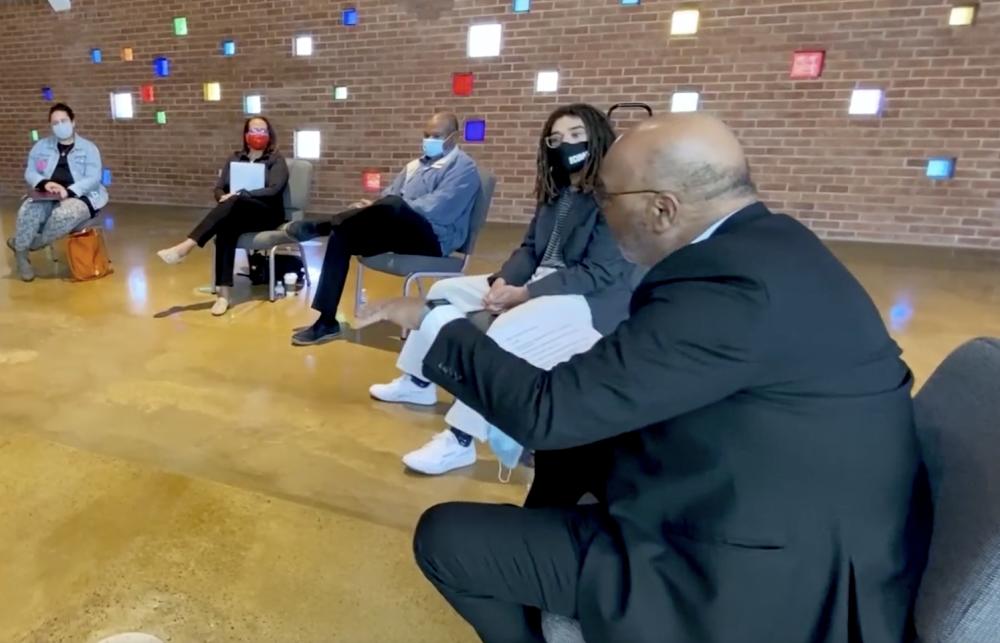
In addition, some ethnic and racial groups showed wide health disparities in the pandemic — although Latinos comprise 40% of California’s population, they had nearly 56% of the state’s COVID infections and 46.5% of COVID deaths.
Thus, clinics such as the one at City Church, a community-minded congregation that serves the Oak Park neighborhood and is adjacent to the UC Davis Health campus, filled a glaring need. As Meeks put it, the vaccine clinic in the church sanctuary “(is) not a broad broadcast, but a very targeted, hand-to-hand, person-by-person encounter to let folks know that COVID vaccinations are being offered in the Oak Park community.”
To modernize the space, UC Davis Health installed high-capacity infrastructure that included routing ethernet cable to the patient registration area and brought in a low-temperature fridge for vaccine storage. Meanwhile, the church sent its members on a special mission to reach the community by canvassing door-to-door.
The effort, what Meeks likes to call “low-tech, high-touch,” quickly registered 100 people for the first clinic on March 12.
City Church chaplain Tracee Lewis knocked on doors, trying to convince residents that the COVID vaccine “will open up the world to them, their family to them, a little bit.” She added that she was eager to be involved in this outreach “as part of not just the African American community but the Oak Park community, which is very diverse.”
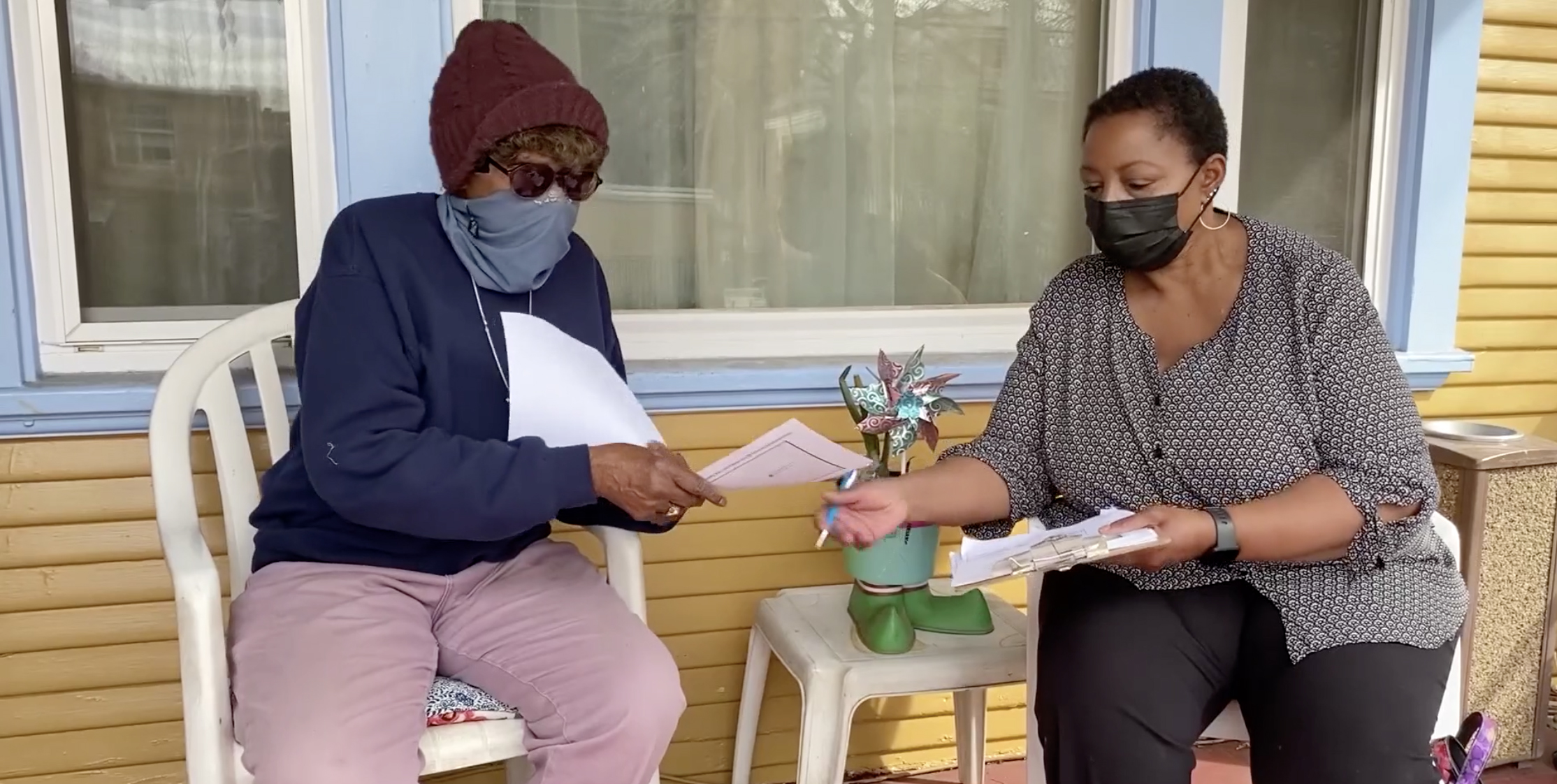
On the clinic’s opening day, a smiling Lewis greeted those she had signed up. She watched as community members worked their way through an efficient operation staffed by UC Davis employees — from the registration desk, to the vaccination table, to the monitoring area.
UC Davis Health has since partnered with numerous community organizations in a robust effort that has resulted in the immunization of tens of thousands of people, many of them from communities with limited access to health care. The initiative includes undergraduate and medical students volunteering at community vaccine clinics, partner organizations providing shots to farmworkers in outlying areas and physicians inoculating people experiencing homelessness.
Providing vaccines under the freeway
During “street outreach” to a highly vulnerable population, six physicians from the School of Medicine and UC Davis Medical Center spent a March morning offering the vaccine to people experiencing homelessness under Interstate 80 Business/Highway 50 in Sacramento.
The doctors, lugging a temperature-controlled storage box, approached tents and rickety recreational vehicles to ask if anyone wanted a dose of the Johnson & Johnson shot. Dozens agreed.
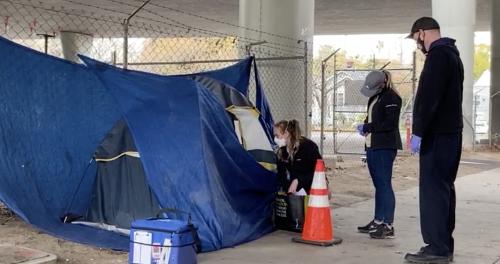
“The goal of this is to meet people where they really are,” said Mary Kathryn Orsulak, an associate physician in the Department of Family and Community Medicine. “Offering this vaccine is just the right and equitable thing to do.”
One team worked the streets under the freeway near the local fire station, while the other group started around Alhambra Boulevard. They worked toward each other in the corridor known as WX, the area between W and X streets.
“Good morning,” Orsulak announced, outside the closed door of a trailer on 24th Street. “I’m sorry to wake you up. I’m with the outreach team, I just want to see if you’re interested in receiving your COVID vaccination.” Nobody answered the door, and she continued on.
A few feet away, Sara Cummins prepped a man’s arm for an injection while Angela Jarman asked medical history questions from a script.
Jarman, an emergency medicine physician, said the experience was meaningful.
“This is something we all do on our day off because it makes us feel like we’re making a real difference in terms of preventing what we see in the emergency department,” Jarman said. “Especially with local patients who don’t have good access to care, this is something that has a measurable impact.”
Orsulak said the vaccine will provide safety to those living under the freeway and acknowledged more needs to be done. “This is one step to decrease barriers to care,” she said.
Or in a mosque
Unlike other vaccination sites in the region, the Shifa Community Clinic is working out of the basement of a mosque in downtown Sacramento and managed by UC Davis students. Over just seven weekends from February through April, the clinic administered 7,600 vaccine doses.
Shifa’s vaccine clinic started because students were dismayed that essential workers, including those employed in health care, were unable to get the vaccine. The students arranged to purchase refrigerators, tapped dozens of volunteers and made connections with Sacramento County Public Health for vaccine supply.
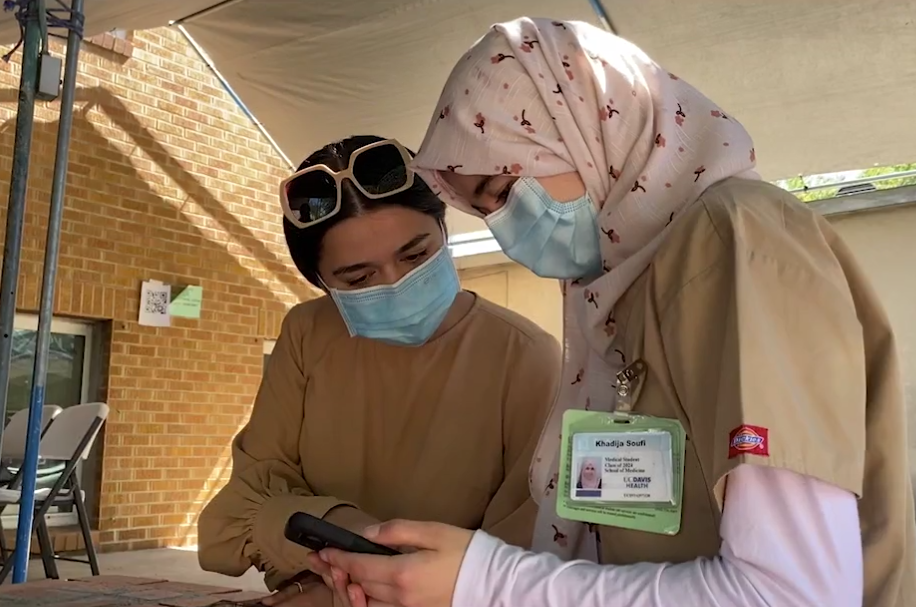
The clinic provides culturally respectful care. In one corner, next to a cart holding dozens of rolled-up prayer rugs, is a section partitioned from the rest of the basement — the space is reserved for women who choose to get their injection in private. “In our cultures,” explained Sirjan Mor, a clinic student leader, “not everyone is comfortable taking off a piece of clothing in front of everyone.”
Concurrently, it’s been tougher for students to get hands-on clinical experience during the pandemic due to patient limits at student-run clinics. But dozens of undergraduates from the Davis campus and the School of Medicine are finding another way to stay engaged — by volunteering to vaccinate patients.
“I never walked into medical school thinking I would get involved in a project of this scale and pull it off,” said Khadija Soufi, a first-year medical student who helps oversee the clinic. “I feel like it empowers us to realize that even though we’re students, we have a voice, and we can have an impact.”
Or in agricultural fields
For months, the UC Davis Western Center for Agricultural Health and Safety, or WCAHS, has been educating farmworkers and farmers alike on how to stay safe during COVID-19, with webinars and printed material in both English and Spanish. The resources explain to agricultural workers what they can do to avoid coronavirus and urge them to get tested for COVID-19.
Thanks to a $3 million initiative funded by the California Labor and Workforce Development Agency to improve farmworker COVID safety, the project is led by experts at the WCAHS, who are collaborating with the UC Davis College of Agricultural and Environmental Sciences Communications Team, a network of community-based organizations, and agricultural industry groups.
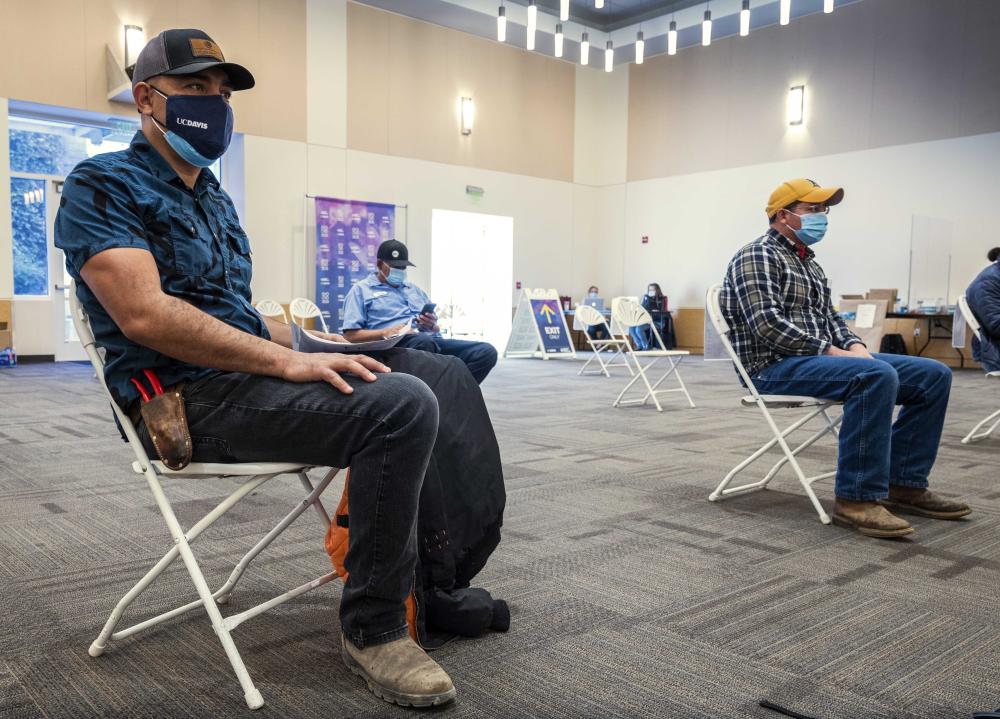
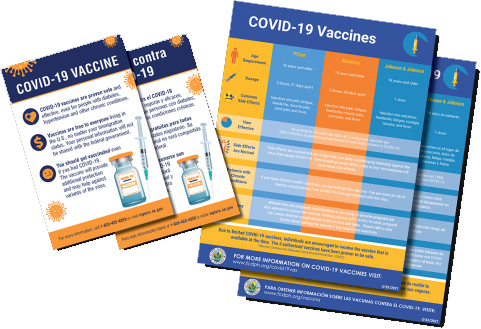
Teresa Andrews, education and outreach specialist for the WCAHS, said “our collaborators go out and they are able to reach people one-on-one in the fields, or host small events.” These efforts, she explained, teach people individually about how to be safe during the pandemic, and “train-the-trainer” activities and webinars help multiply the information. “They are informing the workers and empowering them with the knowledge they need.”
Andrews added, “Usually, in a good year, we can reach out to 1,800 people with our trainings, but with the partnership and collaborations we developed with the funding from the state, we have reached over 160,000 farmworkers and almost 1,500 employers."
Heather Riden, program director at the center, said they are amplifying efforts to spread this information through “community organizations who are trusted by farmworkers and have already been assisting them throughout this COVID crisis.”
In addition, a $3.7 million National Institutes of Health grant is providing agricultural workers in Yolo, Stanislaus, Fresno and Madera counties free access to COVID-19 testing.
The project is called ÓRALE COVID-19: Organizaciones para Reducir, Avanzar y Lograr Equidad Contra el COVID-19 (Organizations to Reduce, and to Advance and Lead for Equity Against COVID-19). In Spanish, “órale” is slang for affirmation about something positive, such as “OK” or “right on.”
In addition to testing for COVID-19, the initiative has begun to offer the vaccine, too.
Or at a drive-thru/pop-up clinic
A UC Davis partnership with La Familia Counseling Center, a well-known nonprofit organization that provides employment training, counseling, education and other services in South Sacramento, has resulted in thousands of vaccine doses.
Gloria Torres, a community health worker at La Familia who helps escort patients from the injection room to the observation room, said the partnership “really makes me feel we are all saving lives” in a community that is struggling.
“For me to see the people come in, especially that live in the heart of our community, it really humbled me,” she said, “because these are people who don’t have that opportunity to get the vaccine. Either they don’t know where to go, they don’t have the language, or they already have different obstacles in front of them.”
UC Davis Health has also been involved in two initiatives to offer the vaccine to Mexican nationals and other Latinos at the Consulate General of Mexico in Natomas.
For us as health care workers, to get out in the community and really be able to serve and meet them face to face, they’re very appreciative. But it’s just as important and heartfelt and meaningful to us." — UC Davis registered nurse Shannon Romero
In one initiative, Elica Health Centers, which has a longstanding partnership with UC Davis Health, has set up a daily vaccination clinic in the consulate’s parking lot. The clinic is based in a large mobile clinic that was purchased with a donation from UC Davis Health.
In another initiative, the partnership between the consulate and UC Davis Health and other organizations made available 500 vaccines recently at a drive-thru clinic attended by Latino families.
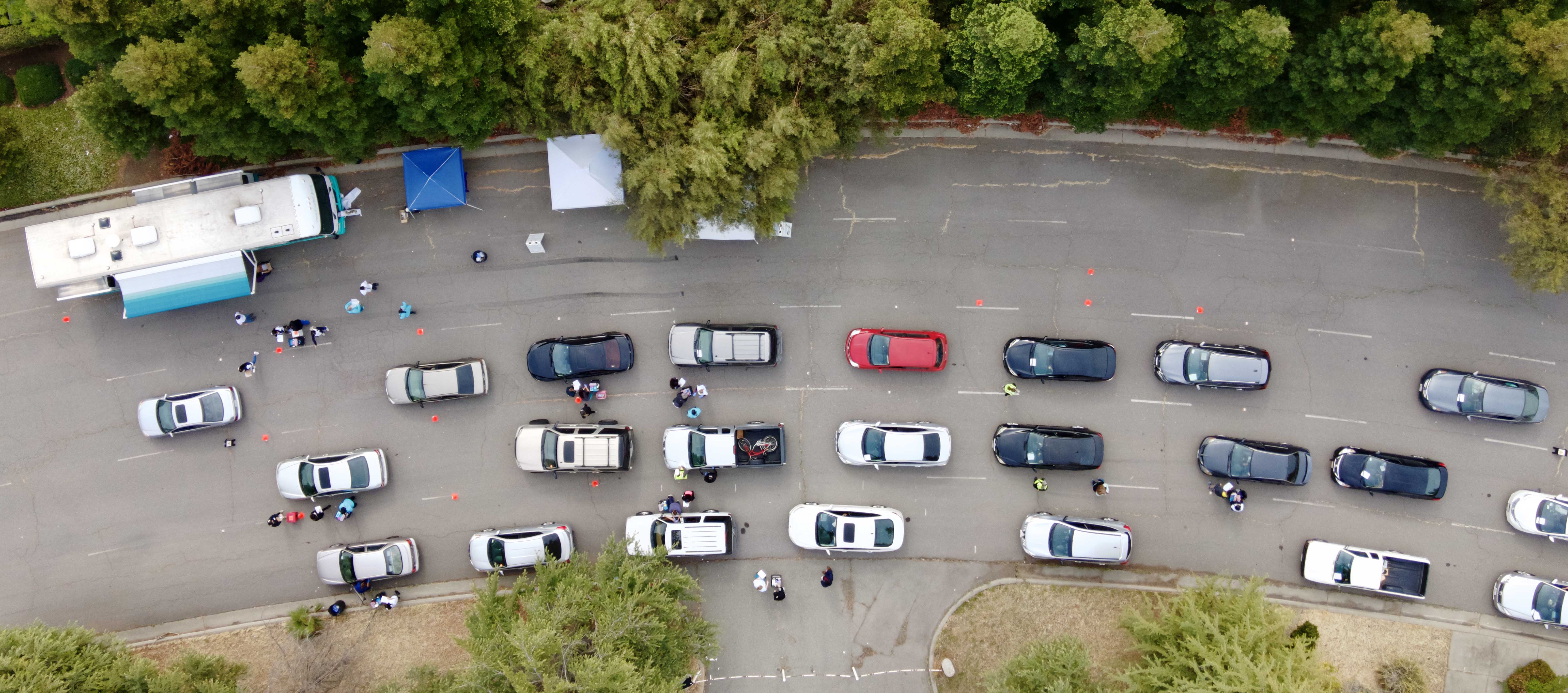
The clinic, in the parking lot of Sleep Train Arena, adjacent to the consulate, was staffed by dozens of UC Davis volunteers.
“It means a lot to give back to the community,” said Karen Chung, a UC Davis third-year medical student. “It’s important for us to be involved and show that we want to encourage everyone to get the vaccine and try to get back to normalcy — and this is a way for the medical community to show that we care.”
Registered nurse Shannon Romero, who helped at the City Church clinic, also acknowledged how purposeful this has felt.
“For us as health care workers, to get out in the community and really be able to serve and meet them face to face, they’re very appreciative,” she said. “But it’s just as important and heartfelt and meaningful to us."
Related Stories
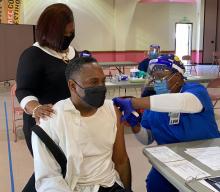
Pop-Up Clinics Offer Vaccines in Churches, Counseling Centers
COVID-19 clinics at St. Paul Missionary Baptist Church and La Familia Counseling Center brought vaccines to hundreds of people weekly.
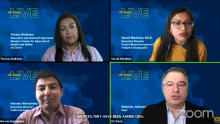
UC Davis Live: Experts Discuss Outreach to Farmworkers and Farmers
Teams from the College of Agricultural and Environmental Sciences have been providing training and resources for farmers and farmworkers about COVID-19 precautions and safety.
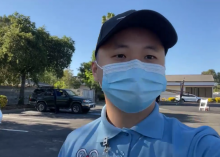
Hmong Lifting Underserved Barriers Hosted Vaccine Clinic
Another student-run clinic, Hmong Lifting Underserved Barriers, brought dozens of volunteers to Hope Clinic in Sacramento for a community vaccination drive-thru.
